Related Research Articles

Sir James Brooke, Rajah of Sarawak, was a British soldier and adventurer who founded the Raj of Sarawak in Borneo. He ruled as the first White Rajah of Sarawak from 1841 until his death in 1868.
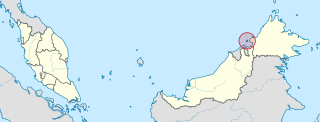
Labuan, officially the Federal Territory of Labuan, is a Federal Territory of Malaysia. Its territory includes Labuan Island and six smaller islands, off the coast of the state of Sabah in East Malaysia. Labuan's capital is Victoria and is best known as an offshore financial centre offering international financial and business services via Labuan IBFC since 1990 as well as being an offshore support hub for deepwater oil and gas activities in the region. It is also a tourist destination for people travelling through Sabah, nearby Bruneians and scuba divers. The name Labuan derives from the Malay word labuhan which means harbour.

North Borneo was a British protectorate located in the northern part of the island of Borneo. The territory of North Borneo was originally established by concessions of the Sultanates of Brunei and Sulu in 1877 and 1878 to a German-born representative of Austria-Hungary, a businessman and diplomat, Gustav Overbeck.

William Radford was a rear admiral of the United States Navy who served during the Mexican–American War and the American Civil War, in which he remained loyal to the Union, despite his Virginia birth. Radford commanded the Ironclad Division in the attacks on Fort Fisher to assert Union control of Cape Fear.
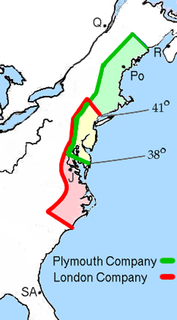
The First Charter of Virginia, also known as the Charter of 1606, is a document from King James I of England to the Virginia Company assigning land rights to colonists for the stated purpose of propagating the Christian religion. The land is described as coastal Virginia and the islands near to the coast, and stretches from present-day South Carolina to present-day Maine. The patch of land itself would remain the property of the King, with the London Company and the Plymouth Company as the King's tenants, and the settlers as subtenants. The colony's government at first consisted of a council residing in London. The document designated the London Company as responsible for financing the project, which included recruiting settlers and also provided for their transport and supplies.

The North Borneo Chartered Company (NBCC), also known as the British North Borneo Company (BNBC) was a British chartered company formed on 1 November 1881 to administer and exploit the resources of North Borneo. The territory became a protectorate of the British Empire in 1888 but the company remained involved with the territory until 1946, when administration was fully assumed by the Crown colony government.

Abdul Momin was the 24th Sultan of Brunei from 1852 until his death on 29 May 1885. He was the son-in-law of the previous Sultan, Omar Ali Saifuddin II.
The Australian Agricultural Company (AACo) is a public-listed Australian company that, as at 2018, owned and operated feedlots and farms covering around seven million hectares of land in Queensland and the Northern Territory, roughly one percent of Australia's land mass. As of July 2008 AACo had a staff of 500 and operated 24 cattle stations and two feedlots, consisting of over 565,000 beef cattle.
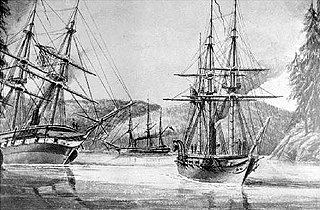
HMS Plumper was an 8-gun wooden screw sloop of the Royal Navy, the fifth and last ship to bear the name. Launched in 1848, she served three commissions, firstly on the West Indies and North American Station, then on the West Africa Station and finally in the Pacific Station. It was during her last commission as a survey ship that she left her most enduring legacy; in charting the west coast of British Columbia she left her name and those of her ship's company scattered across the charts of the region. She paid off for the last time in 1861 and was finally sold for breaking up in 1865.

The Raj of Sarawak, also State of Sarawak, located in the northwestern part of the island of Borneo, was an independent state that later became a British Protectorate. It was established as an independent state from a series of land concessions acquired by an Englishman, James Brooke, from the sultan of Brunei. Sarawak received recognition as an independent state from the United States in 1850, and from the United Kingdom in 1864.

Fuelling stations, also known as coaling stations, are repositories of fuel that have been located to service commercial and naval vessels. Today, the term "coaling station" can also refer to coal storage and feeding units in fossil-fuel power stations.
James Motley was a Yorkshireman closely associated with South Wales and Borneo.
Henry Wise was a mariner and merchant associated with the Far East.
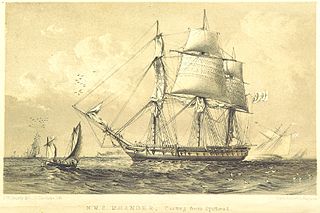
HMS Maeander was a Seringapatam-class sailing frigate of the British Royal Navy. Her service included the suppression of piracy, the Russian War, and support for the suppression of slavery with the West Africa Squadron. She was wrecked in a gale in 1870.

The Rhode Island Royal Charter provided royal recognition to the Colony of Rhode Island and Providence Plantations, approved by England's King Charles II in July 1663. It outlined many freedoms for the inhabitants of Rhode Island and was the guiding document of the colony's government over a period of 180 years.

The Crown Colony of Labuan was a British Crown colony on the northwestern shore of the island of Borneo established in 1848 after the acquisition of the island of Labuan from the Sultanate of Brunei in 1846. Apart from the main island, Labuan consists of six smaller islands; Burung, Daat, Kuraman, Papan, Rusukan Kecil, and Rusukan Besar.

The Treaty of Labuan was signed between Great Britain and the Sultan of Brunei on 18 December 1846. Under this treaty, the Sultan ceded the island of Labuan to Great Britain.
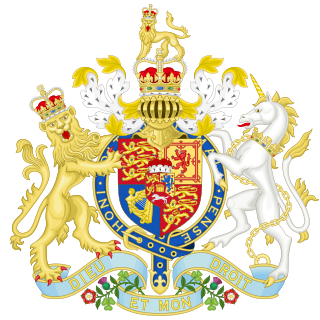
An Act for prohibiting Trade with the Barbadoes, Virginia, Bermuda and Antego or Act prohibiting Commerce and Trade with the Barbodoes, Antigo, Virginia, and Bermudas alias Summer's Islands was an Act of law passed by the Rump Parliament of England during the Interregnum against English colonies which sided with the Crown in the English Civil War.

The Chimney Museum is a museum in Kubong, Labuan, Malaysia. The museum details the history of Kubong when coal mining was at its peak under the administration of the British North Borneo Chartered Company.
References
- ↑ Parliamentary Papers [227] (1848)
- ↑ Parliamentary Papers [1976] (1855)
- ↑ Minutes of Proceedings of the Institution of Civil Engineers. XIV. Institution of Civil Engineers (Great Britain). 1855. pp. 126–127.
- ↑ "John Radford Death Notice". FIBIS Database. The Times. 1857-01-07. Retrieved 2021-02-05.